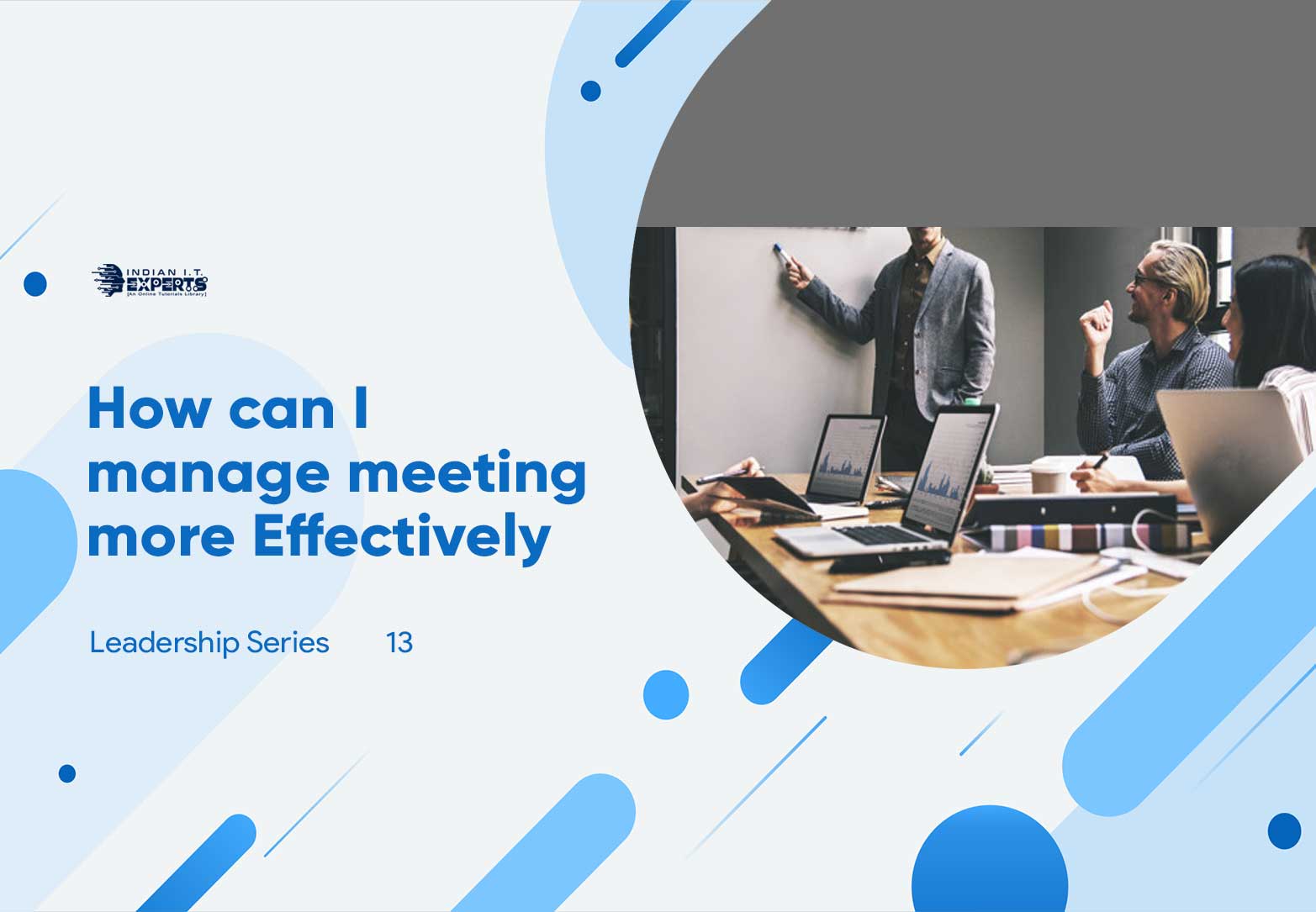How can I manage meeting more Effectively? | Tips For Managing Meetings Effectively

How can I manage meetings more effectively? An unknown wit once said, “when I die, I hope it’s in a meeting. The transition from life to death is hard to see “a pretty accurate description of how it feels to attend many of the meetings we all have to face at work.
You already are aware that many of the meetings you attend are ineffective, causing more frustration and eating into your limited time. As a leader, you should not inflict the same torture on your team members.
Many leaders overlook the substantial cost, financial and non-financial, attached to failed meetings. Taking a group of employees, at any level, away from their work, even for an hour, is a significant cost in terms of productivity- and even greater when the meeting produces little concrete value. Worse still are the hidden costs of damaged motivation and morale among those who have to attend meaningless or badly-run meetings. How can I manage meetings more effectively?
And, for you personally, as a leader, if your meetings are constantly ineffective, you chip away at your credibility in the eyes of your team members- because, when a meeting fails, regardless of what actually caused that to happen, it is the leader’s fault. Other people may have contributed to the poor outcome but, ultimately, the leader must take the blame. The challenge you face in terms of running an effective meeting is how to get the right balance between control and participation. Anyone can control a meeting simply by not allowing participation, but then what would be the point?
Getting the best out of your meeting is always a challenge but there are simple steps you can take that will help. First, understand the principle of ‘conditioning’ in relation to meetings. All of us become conditioned to behave and act in a particular way when exposed to certain stimuli over a prolonged period.
Confused regarding your career then click on the download button below, and get the best solution from our experts.

In meetings, this can manifest itself in many ways, for example, if your meeting always starts late, then employees become conditioned that they never start on time, so they arrive late and the problem gets progressively worse. In addition, if your meetings constantly lack structure and end up going round in circles, then people become accustomed to this and come with negative expectations each time, making your role of managing the meeting even harder. If you always allow certain individuals to dominate the meeting, then you condition them into believing that they can continue to do so. How can I manage meetings more effectively?
Making your meetings more Effective
To make meetings more effective, consider three aspects of the meeting: before, during and after:
Before the meeting
Preparation is everything in terms of getting the foundation for meeting right, so always consider:
- What is the purpose of the meeting / what do I want to achieve?
- Who actually needs to be there?
- What is the most appropriate time to hold the meeting?
- Where is the best place to hold the meeting?
- What will be discussed (the agenda)? What can reasonably be covered in the time available?
By ensuring that everyone knows in advance, not only what the agenda will be but also what the meeting will not be about, you start down the road to effectiveness because you set expectations appropriately.
During the meeting
Like any form of communication, your meeting must be structured –
Follow this basic approach:
Next, you should:
- Outline the agenda points.
- Encourage participation – through you!
- Emphasise time constraints.
- Allocate responsibilities (especially a note-taker/ timekeeper).
Some leaders also appoint a ‘conscience’ for the meeting. This is an interesting idea, as the person nominated can interrupt at any time when the meeting goes off-track to remind everyone that the point under discussion is not on the agenda. This saves you from having to do it and looking like you are closing down the debate. Also by appointing a note-taker, timekeeper and conscience, you change the dynamic from one person controlling the meeting (you) to for people contributing to making the meeting more effective. Obviously, if you use this approach, rotate the positions for each meeting. How can I manage meetings more effectively?
Main Part: Here, you need to work hard to get the right balance between control and participation. In the beginning, it is important that you prevent any unacceptable behaviour from going unopposed; to do otherwise, creates an impression that they are acceptable. You may have to be quite ‘steering’ in the beginning but stick with it as you will find these negative type behaviours will disappear from your meeting over time.
In working through the content of the meeting, always introduce each agenda point and frame the discussion. By doing this, you focus the conversation and also can point out what will and will not be discussed under that agenda point.
- Maintain control / participation
- Keep the discussion on track.
- Allow involvement form all participants, who should wait to be brought into the discussion, so only one person talks at a time.
- Prevent disagreements form getting out of hand, without stifling healthy debate.
- Keep to the allocated time.
To ensure clarity as to the outcome of agenda points, you must summarise any agreement/ action for each point before moving to the next. Agreed actions should then be noted by the note-taker.
Conclusion
Managing a meeting effectively means that it finishes on time; or, at the very least, that when the allocated time is reached, a conscious decision is made to extend it. At the end of a meeting, you should summarise all the points agreed, ensuring that each participant is clear on the action they must take following the meeting and the completion date for same. Thank everyone for attending and for participating.
After the meeting
After the meeting, ensure that the action plan is circulated and that any action agreed is implemented within the agreed timeframe. Failure to do so sends out the message that nothing happens as a result of your meeting, which lowers expectations for future meetings.
Finally, feedback is always good. So do not be afraid to ask your team members on an ongoing basis for their comments on how they feel the meeting went and any proposals they might have for subsequent meetings.
Following these simple steps will ensure that, over time, the quality and effectiveness of your meeting will improve.




